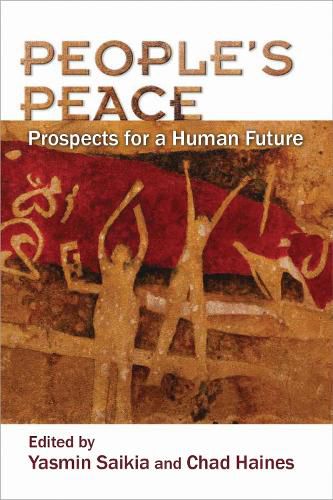Readings Newsletter
Become a Readings Member to make your shopping experience even easier.
Sign in or sign up for free!
You’re not far away from qualifying for FREE standard shipping within Australia
You’ve qualified for FREE standard shipping within Australia
The cart is loading…






People’s Peace lays a solid foundation for the argument that global peace is possible because ordinary people are its architects. Saikia and Haines offer a unique and imaginative perspective on people’s daily lives across the world as they struggle to create peace despite escalating political violence. The volume’s focus on local and ordinary efforts highlights peace as a lived experience that goes beyond national and international peace efforts. In addition, the contributors’ emphasis on the role of religion as a catalyst for peace moves away from the usual depiction of religion as a source of divisiveness and conflict.
Spanning a range of humanities disciplines, the essays in this volume provide case studies of individuals defying authority or overcoming cultural stigmas to create peaceful relations in their communities. From investigating how ancient Jews established communal justice to exploring how black and white citizens in Ferguson, Missouri, are working to achieve racial harmony, the contributors find that people are acting independently of governments and institutions to identify everyday methods of coexisting with others. In putting these various approaches in dialogue with each other, this volume produces a theoretical intervention that shifts the study of peace away from national and international organizations and institutions toward locating successful peaceful efforts in the everyday lives of individuals.
$9.00 standard shipping within Australia
FREE standard shipping within Australia for orders over $100.00
Express & International shipping calculated at checkout
People’s Peace lays a solid foundation for the argument that global peace is possible because ordinary people are its architects. Saikia and Haines offer a unique and imaginative perspective on people’s daily lives across the world as they struggle to create peace despite escalating political violence. The volume’s focus on local and ordinary efforts highlights peace as a lived experience that goes beyond national and international peace efforts. In addition, the contributors’ emphasis on the role of religion as a catalyst for peace moves away from the usual depiction of religion as a source of divisiveness and conflict.
Spanning a range of humanities disciplines, the essays in this volume provide case studies of individuals defying authority or overcoming cultural stigmas to create peaceful relations in their communities. From investigating how ancient Jews established communal justice to exploring how black and white citizens in Ferguson, Missouri, are working to achieve racial harmony, the contributors find that people are acting independently of governments and institutions to identify everyday methods of coexisting with others. In putting these various approaches in dialogue with each other, this volume produces a theoretical intervention that shifts the study of peace away from national and international organizations and institutions toward locating successful peaceful efforts in the everyday lives of individuals.